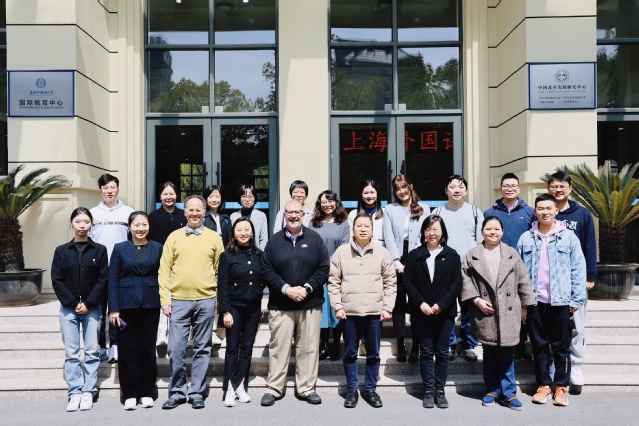
By Guo Yishun,Chen Yu,Lyu Yuhao | Photo By Dong Jiaqi
The “Symposium on Curriculum Reform for Journalism and Communication in the Age of AI” took place at the Songjiang campus of Shanghai International Studies University (SISU) on March 21. The event, co-hosted by SISU’s School of Journalism and Communication and the Grady College of Journalism and Mass Communication at the University of Georgia (UGA), brought together prominent educators and experts to discuss the future of journalism education in an AI-driven world.
The symposium was attended by key figures including Grady College Dean Charles N. Davis, SISU’s School of Journalism and Communication Dean Guo Ke, and Vice Deans Chen Peiqin, Yan Yining, and Zhu Lian. Also present were Juan Meng, Head of the Department of Advertising and Public Relations, and Itai Himelboim, Director of the SEE Suite - Social Media Engagement & Evaluation lab at UGA. SISU faculty members and students also participated in the discussions.
The event, chaired by Vice Dean Yan Yining, centered on how journalism and communication curricula should evolve to keep pace with the rapidly changing landscape shaped by artificial intelligence. The discussions focused on the need to restructure courses and teaching methods to better prepare students for the challenges and opportunities of the AI era.
Dean Guo Ke emphasized the importance of strengthening the connection between academia and industry, urging educators to foster ongoing dialogue with professionals in the field. He argued that collaboration with industry leaders ensures that the curriculum remains relevant and up-to-date. As part of its efforts, SISU has organized several site visits for faculty and students to major companies, such as JOY Group, Shanghai United Media Group, and Bilibili. These visits provide students with valuable internship opportunities and help broaden their career prospects.
Dean Charles N. Davis from UGA also shared insights from Grady College’s experience in developing market-relevant courses. He highlighted the need for interdisciplinary, hands-on projects that enhance student skills while increasing industry involvement in academic programs. Dean Davis suggested that universities should invite media professionals not only as guest speakers but also as adjunct faculty to contribute directly to both undergraduate and graduate courses.
Vice Dean Chen Peiqin pointed out that AI technology presents both challenges and opportunities for journalism education. While AI can lower technical barriers, it also opens up new avenues for innovation in both teaching and research, transforming the way journalism is practiced and studied.
Juan Meng, Head of SISU’s Department of Advertising and Public Relations, noted the value of alumni engagement in bridging the gap between academia and industry. Alums working in the field are often eager to return to campus to share their experiences and knowledge with current students, which offers an invaluable learning opportunity for the next generation.
SISU and UGA have maintained a strong academic partnership since 2019 through their 3+1+1 Bachelor’s-Master’s joint program. During the symposium, UGA representatives renewed this agreement and also established a doctoral exchange program. Currently, two SISU undergraduates and one doctoral student are studying at UGA, further strengthening the collaboration. This partnership reflects both universities’ commitment to adapting to the impact of AI and other emerging technologies on the media and communication fields.


 |Hongkou Campus|550 Dalian Road (W), Shanghai 200083, China |Songjiang Campus|1550 Wenxiang Road, Shanghai 201620, China
|Hongkou Campus|550 Dalian Road (W), Shanghai 200083, China |Songjiang Campus|1550 Wenxiang Road, Shanghai 201620, China